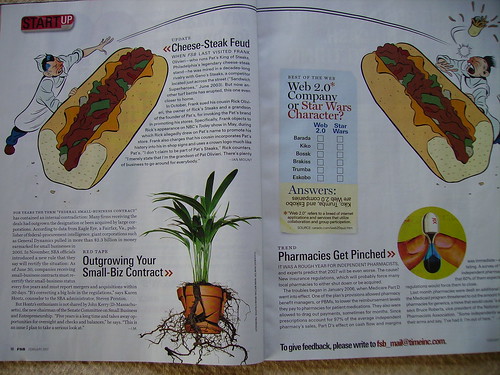Aldo Castañeda (who is a really great interviewer) was kind enough to invite me to chat regarding VRM Scenarios for his Story of Digital Identity podcast.
Hammer Time
Bambi Francisco: “It’s only a matter of time before corporate America embraces social networks.”
Hello, World.
Tying One On
A couple of decades ago, my old friend Joe DeCarlo used to talk about “posts” in communities and social groups. A “post” has nothing to do with a blog post in these conversations, incidentally. In these conversations, a “post” was a person or concept that was solid. Tall-standing. Deep-rooted.
A post was the anchor to which other things could be lashed.
On February 7, in his SuitWatch piece, Doc Searls tells the story of his interactions with Sayo Ajiboye. Doc:
“A few years ago I had a Socratic exchange with a Nigerian pastor named Sayo, whom I was lucky to find sitting next to me on a long airplane trip.
He went on to point out that, in his country, and in much of what we call the developing world, relationship is of paramount importance in public markets. In the industrialized world, prices are set by those who control the manufacturing, distribution and retail systems. Customers do have an influence on prices, but only in the form of aggregate demand. The rates at which they buy or don’t buy something determines what price the “market” (meaning: the demand side) will bear. But the whole economic system is viewed mostly through the prism of price, which is seen as the outcome of tug between supply and demand. Price still matters in the developing world, Sayo said; but there is a higher context that tends to be invisible if you view markets exclusively through the prism of price. That context is relationship.
He said relationship is not reducible to price, even though it may influence price. It operates at a higher level. Families and friends don’t put prices on their relationships. (At least not consciously, and only at the risk of cheapening or losing a relationship.) Love, the most giving force in any relationship, is not about exchanging. It is not fungible. You don’t expect a payback or a rate of return on the love you give your child, your wife or husband, your friends.
Yet relationship has an enormous bearing on the way markets work, Sayo said. And it is poorly understood in the developed world, where so much comes down to ‘the bottom line.'”
If you haven’t read the SuitWatch piece, it’s worth the time. Here’s the link again. And I have a feeling the Sayo story is a post that will anchor many other things over the next few years. Actually, some things are lashed to it already.
One of the things the Sayo story is currently anchoring is a discussion of how VRM might apply to changing public radio. In other words, can we use the concepts of VRM to create direct relationships with artists and producers?
Also, as I write this, I’m taking a sidelong glance at Dave, who has chimed in on this issue. Dave’s been very vocal and a key lynchpin to the development of what we currently call “podcasting.” I wonder if, down the road, we’ll see “public radio” and “podcasting” as synonymous terms. Actually, it’s much bigger than that. Much, much bigger.
If this plays out, what we currently call “podcasting” becomes public broadcasting. Think about it.
Oh, look what’s in the bottom of my mug…some tea leaves!
What Humans Do
Paul Greenberg: “The twenty-first century customer is just doing what humans always do — attempting to participate in the decisions, large and small, that affect their lives at all levels.”
Bonus geek links: A Process Pattern for Organizations (and the patterns themselves)
Everyone’s An Expert (Just Not On Copyright Law)
Interesting dust-up brewing this morning. In one corner is Seth Godin. In the other? “BNPublishing.” (Whoever they are.)
Apparently, BNPublishing has taken Seth’s free Everyone’s An Expert e-Book, repackaged it, and is now selling it through Amazon, eBay, and one would presume other outlets. A quick dig this morning on the BNPublishing website seems to show their business model as taking non-rights-protected works and packaging them up for easy sale. For example, they are also selling titles such as The Art of War and the like on their site.
The issue: Everyone’s An Expert was released under a CreativeCommons-Attribution-2.5 license, which allows commercial usage.
(There is another license, CreativeCommons-Attribution-NonCommercial-2.5, that precludes commercial usage. But that’s not the license that was used.)
Any experts out there? Are there other aspects (e.g. trademark) that would prevent this?
Not sure, but I think Seth might be out of luck on this one. YAFLE.
(N.B. Not a lawyer, etc.)
Update: MindBlogging has a similar take.
There Is No “MySpace”
Great point from Dean. Trying to pull all of one’s personae into a single representation feels unnatural. Different parts of ourselves are relevant at different times, in different places, in different contexts, with different people.
Future Is Here, Unevenly Distributed, Etc.
“It’s all a million miles away from high-powered branding from the top down. You let go of the trappings of high office when you follow this path, and get down to the grassroots, taking the risk of having some ordinary, rambling conversations in the real world, instead of broadcasting brand mantras over mainstream media. There are no comforting stats of impacts-per-thousands spent this way, just the reality of a certain amount of grind. Of course it’s not really a grind if you happen to like talking to people.”
–Johnnie Moore, regarding Hugh (more), regarding the way it is.
Clue Unit #3 Show Notes: February 7, 2007
(click here to subscribe to this feed)
Episode 3, about 30 minutes.
Today’s Topic – Fear:
For this episode, we focused on a single topic: "Business fear of connecting with communities online." What is it that prevents businesses (especially, it seems, larger ones) from connecting with customers on line. Is it cultural? Legal? Educational? Our thoughts in here, would love to hear yours…
(crossposted from http://www.clueunit.com)
“Web 2.0 or Star Wars” Called “Best Of The Web” By Fortune Small Business
Cerado’s “Web 2.0 or Star Wars” test, the little quiz that could, was just featured as “Best of The Web” in the February 2007 print edition of Fortune Small Business. Thanks, Fortune!




